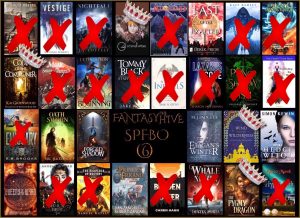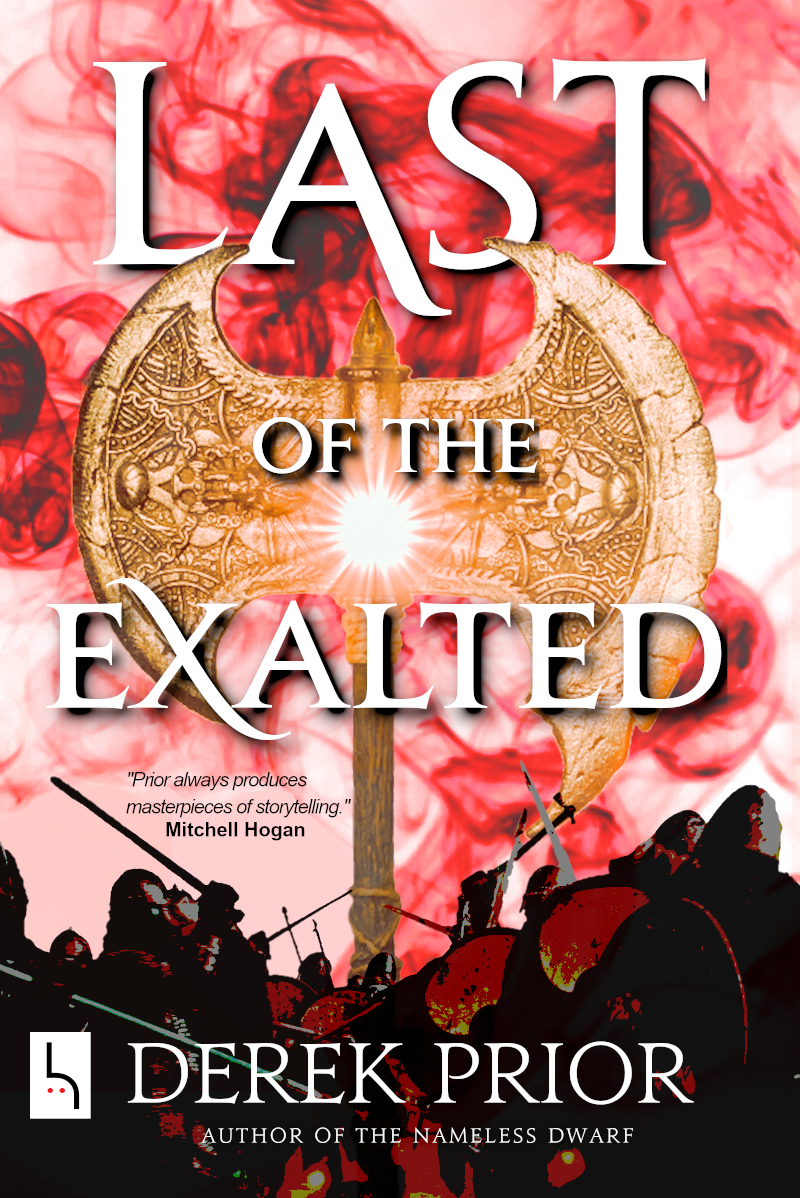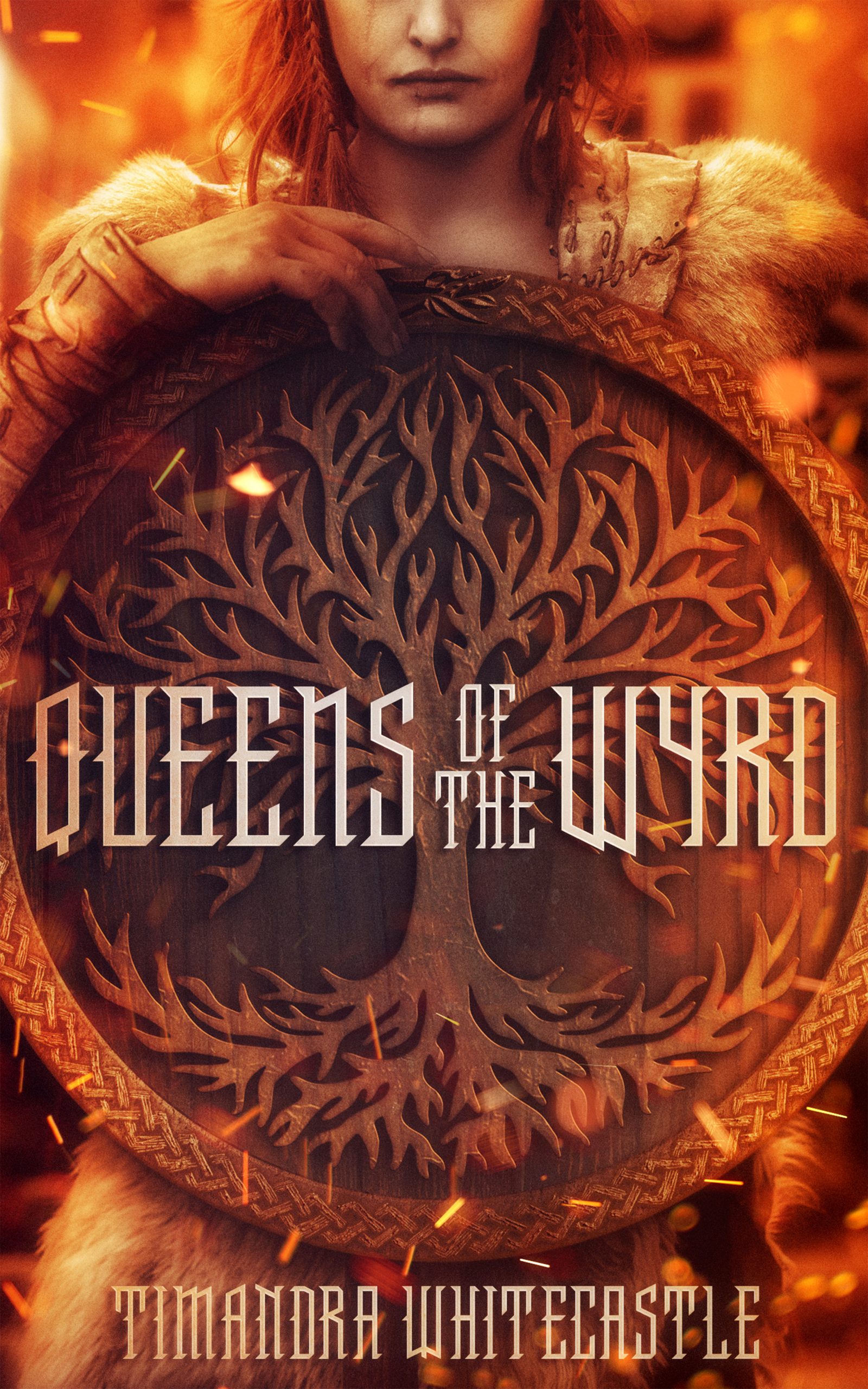SPFBO 6: Eliminations Part 5
Every week, we’ll be announcing a batch of five books.
Three will be eliminated on the Wednesday, carrying two forward to the Friday, when we’ll announce a semi-finalist.

Last week, we eliminated another three books, and revealed PRINCE OF SHADOW AND ASH by Selina R. Gonzalez as our fourth quarter-finalist and CODE OF THE COMMUNER by Kai Greenwood as our fourth semi-finalist.
So, without further preamble, here are our next three eliminations, followed by the announcement of this week’s Quarter-finalists from which we will be choosing our second semi-finalist in our Friday post.
ELIMINATION #13
Magic, Sorcery & Witchcraft
Stas Borodin
The steppes were always feared, for the steppe warlocks were cruel and ruthless.
For centuries, the tiny kingdom of Lieh was a shield that protected civilization from the hordes of ferocious nomads. But one day, everything changed. The truce that had lasted for many years was broken and a powerful new warlock invaded the kingdom.
Young Marcus Grimm must take up arms and join his father’s army in his maiden battle. Adventurer, student at the Academy of Magic, pirate hunter, army scout and slayer of sorcerers – on the way he will find true friends and make some fearsome enemies.
He will become the Hand of Destiny.The first book of the Marcus Grimm saga.
Translated from Russian.
Nils’ thoughts:
Although I like this cover – the armoured soldiers pressed together is very effective – I have seen an alternative cover which I vastly prefer as it catches my eye more.
Magic, Sorcery and Witchcraft had one of those openings which I partly enjoyed but also felt there needed to be much more clarity presented for me to fully invest and immerse myself into the story.
My initial reaction to the prose was that considering this is a translation, it was well done. There were some really lovely descriptive passages which I felt captured the scene vividly;
‘For a very long time I gazed at the dying bonfire of the sunset, admiring the fading colours and the slow leisurely approach of the summer night. A round moon soon appeared in the sky, shining like my grandfather’s polished shield.’
However there were also parts which confused me. The setting seems medieval, but they have ‘gramophones’? At one point we are in a castle and then abruptly we are in an almost desert-like setting? I think time often passed too quickly and therefore the chapters were a little jarring.
From what I gather from the plot, the main character is going off to fight in a war with his father against ‘nomads’, presumably because they suspect their eldest brother/son has previously fallen during said battle, but other than that we are not given any information about these ‘enemy nomads’. Instead of this being mysterious and intriguing, it actually comes across as frustrating. I feel at around the 10% mark we should have at least an inkling of the villain’s motive; why are the enemy invading and destroying lands – revenge for an old slight? Domination? Taking back the lands that were once theirs? Who exactly is the main protagonist fighting against? Personally I need a villain to be just as well fleshed out as a ‘hero’, otherwise how can a reader become invested if we know so little? I’ve never particularly been fond of evil just for the sake of evil arc.
On the other hand Borodin does well to add lots of details of warfare, there is a clear passion for it here and I very much appreciated that. Much in the same way Christian Cameron does in his Traitor’s Son Cycle, we see descriptions of armoury, weaponry and battle tactics, we glimpse fairly authentic warfare scenes throughout the beginning of this book. However, perhaps a little too much attention was paid to these details and therefore in depth characterisation and plot became lacking? As much as I enjoy an action packed story full of battle scenes, a story cannot rely on this alone.
Having said that I do think this one could have a much stronger beginning with some thorough editing and added characterisation because I feel it has a lot of potential.
Theo’s thoughts:
I understand this is a translation into English but the prose is generally solid. There’s a few parts where word choice or idiom may have been lost in translation – something that a look through by an English language editor could have helped with. For example,
“Do you want to smell under my mare’s tail”
could perhaps have been just
“Do you want to sniff my horse’s arse.”
However, I’ve read plenty of untranslated original english prose that was clunkier. The premise implicit in the title is of three different kinds of battle magic and the people who wield them as an empire goes to war.
Our first person protagonist, younger son of a noble house, spends the whole of the first part (21%) of the book on a campaign and then a long battle. It is similar in some ways to Jeff Salyards Bloodsounder Arc series where a novice is embedded with a troop of seasoned warriors and encounters the brutality of battle. Also it reminded me a bit of Django Wexler’s The Thousand Names, another book with a love of military detail and powerful magic.
The magic comes with a cost and those who wield it need to be physically strong so the wizards and sorcerers are not your usual feeble fops in voluminously sleeved gowns and pointy hats. There is a love of battle and everything to do with battle here, the effects of wearing armour, the elegance of the soldiers – even their horses are described with hyperbolic enthusiasm. It does ring true to the kind of voices you hear from contemporaneous accounts – soldiers waxing lyrical about the power and fortitude of their own people (like the accounts of Sergeant Wheeler in Wellington’s Peninsular Campaign).
It also reminds me a bit of another translation that I once dipped into, Livy’s description of the Roman side of Hannibal’s campaign in Italy. Magic, Sorcery and Witchcraft has that same breathless narrative of action after action, a catalogue of violence more than a story. Nonetheless it held my attention better than many and the first part ends at a pivotal point with our protagonist very much bloodied, his country battled almost to a standstill, and an opportunity for the story to go in almost any direction. It’s a bold move to start a book with a climactic battle sequence (much as it was bold of Sword of Kaigen to put a climactic battle in the middle rather than the end of the book). I’m curious but not quite fascinated as to where this might go next – so it’s orange from me.
Beth’s thoughts:
Like Theo, Magic, Sorcery, and Witchcraft ended up as an ‘orange’ maybe for me. Similarly to Nils, I struggled to follow the narrative – it seems Theo was able to glean much more understanding from it than myself. I normally enjoy being dropped into a story with little exposition; but the jarring way the narrative skips ahead, and the sometimes-undeveloped sentences (as Theo put it, lost in translation) left me scrambling to catch up.
I found myself stopping too frequently to ask myself what was happening – wait, what time period are we in? Wait, where is he now and where was it he was supposed to be going again? Wait, they’re marching out now? Who’s attacking them again? My immersion was constantly being halted in this way, so I couldn’t feel swept into the story.
When our protagonist was finally on campaign with the mages (wait, why has he been put in this particular squad?) it felt like this was what the author was rushing to get to? Like perhaps leading up to this point was the necessary set up that they had to do, but this finally was the bit they were looking forward to writing. Which ultimately is why I marked it as a ‘maybe’; I had the sense the author had a strong story to tell, but I was struggling to invest myself in it.
Incidentally on the note of covers, like Nils I feel the other cover is much nicer and certainly grabs my attention more, but the cover with the armoured soldiers is much more in keeping with the story I read.
Filip’s thoughts:
I’m sorry to say I quite disliked Magic, Sorcery & Witchcraft. It’s chock-full of clichés and exclamations:
Father looked up and smiled. “They are the best!” He gently squeezed her hand. “Remember, I trained these boys myself.”
“You trained your son as well.” My mother snatched her hand from his fist. “It didn’t do him much good.”
Father stood up abruptly, his face pale. He clutched the hilt of his sword and headed for the door. “All is not lost. There is still hope! Eran will be back!”
The exposition is on the sloppier side, lacking in elegance: “The old servant looked worried too, because his son was my older brother’s squire.” Some of the titles used by characters to refer to other characters struck me as odd — a sergeant calls his officer, “Your honour,” which struck me as odd beyond measure; there’s repetitions: “…its right row of wheels slowly rising into the air, and slowly toppled over”; and even strong set ups eventually devolve into the clichéd. I found little to be hooked by, and after two months, I remember next to nothing about it, despite notes and highlights.
Julia’s thoughts:
I was looking forward to this one as the cover caught my eye! Sadly I found the prose a bit bland and the dialogue felt scripted and stilted to me. I didn’t much care for the characters, and found myself skim reading after the first 10% or so, so I gave up. The story was intriguing, so there is definitely potential, but the craftsmanship sadly didn’t hold up for me.
ELIMINATION #14
Tommy Black and the Staff of Light
Jake Kerr
A magical legacy that isn’t what it seems!
For fourteen-year-old Tommy Black, nothing is worse than being raised by an overprotective grandfather in the city that never sleeps. That is until his grandfather is captured by magical creatures and Tommy has to save him with his family’s magical staff.
That wouldn’t be so bad, but the only magic he can do with the staff is weak–making light. What the heck can you do with light?
Tommy finds out as he fights golems, shadow creatures, and djinn in a journey that features a magical river, an enchanted train, and an illusionary fortress. But the worst part of all? Tommy has to save his grandfather with the help of Naomi, a girl whose talent with magic is only rivaled by her ability to hurl insults.
Theo’s thoughts:
So – urban fantasy, young adult and alternate history set in Manhattan before the second world war, an interesting mix. It reads well at the start, but does have a strong YA feel with its 14 year old first-person protagonist and his mysterious grandfather. Pace is quite good in that the action piles on in successive scenes and the story is swept along by events. There is a sense that Tommy’s journey on a river is almost a metaphor for the whole beginning of the book – in that he is a little low on agency, but that is perhaps the nature of the story, the apprentice having his true talent revealed and then being led to develop it.
The storyline does put it at the young end of the YA spectrum for me. It reminds me a bit of Skulduggery Pleasant, in the rather simplistic way it sets up challenges and unravels enigmas. The bit where Tommy is being trained in the use of the staff also reminded me of the bit in StarWars where Obi Wan is training Luke Skywalker in the use of the force on the Millenium Falcon and, after a few moments of screen time and a few mystic mumbles, Luke is suddenly a relatively empowered Jedi knight.
I think there is a risk with YA that keeping a story simple and accessible risks patronising the readers. There is a certain effectiveness to this book and I wouldn’t dismiss all YA out of hand, but I don’t think it’s done enough for me to want to read on.
Nils’ thoughts:
The opening of Tommy Black gave me vibes of Miss Peregrine’s Home for Peculiar Children and perhaps Percy Jackson too. I believe for young teens just starting out in the fantasy genre Tommy Black would make a great place to begin with as it fits snuggly into the YA genre. However, both Miss Peregrine and Percy have a level of depth which makes them appealing to a wide audience of both adults and children, whereas the story here feels too simplistic and not refined enough for it to achieve that.
The story follows our young protagonist Thomas Black as he recounts events through a first person narrative. Thomas and his grandfather are shown to be fending off encroaching oozing shadows. I feel this is a great start, action packed and mysterious enough to hook a young reader in. We learn of an ancient war between light and dark, a semblance of peace was once gained but is now broken.
The narrative deals with an age old trope really, and unfortunately it offers nothing fresh or thrilling to it. Whilst this is fine for new fantasy readers, for someone like me who has read tons of fantasy books, it felt stale..
Beth’s thoughts:
I thought the cover was eye-catching and very professional looking!
As Theo has already mentioned, I thought the opening quite well paced – I found myself reading along quite swiftly. It was certainly easy to read; but then, like Nils has implied, it wasn’t really proffering anything that was taxing or particularly deep anyway.
I think my biggest issue was with Tommy himself. I didn’t feel inspired by him, and actually found him coming across as much younger and more childish than his apparent fourteen years. Unfortunately, his story simply did not grip me enough.
Filip’s thoughts:
Tommy Black and the Staff of Light is a good piece of YA fiction, with some minor typos, as well as a certain amount of sloppiness where exposition is concerned. Reading this, I was curious about the elements of alternate history — this hints at a world of magic underlying the great conflicts of the 20th century, both WW1 and WW2: “The truth is that your grandfather is the greatest Archmage to ever wield the staff. He destroyed the Kaiser’s troops. He broke the Kaiser’s will. He laid waste to–”.
Simple prose, clean, without flourish, inimical to complexity. If you enjoy adult fiction, you might discover in Tommy Black an enjoyable adventure, but it doesn’t do enough to impress some of us judges inclined to more adult fantasy.
Julia’s thoughts:
I finished this one (because it was on audible). It is an entertaining enough YA fantasy that is set around the WW2 era. I liked the characters well enough, even though they lacked a bit of depth.
For YA it was well enough, but it definitely wasn’t good enough to compare to my favourite YA or to some of our adult fantasy entries.
I personally really didn’t like to have Hitler used as “the German magician”. While I think it is great to teach kids about that horrible time, I just don’t feel comfortable to use something as horrid as the Nazi regime for some entertaining magical adventures…
Beth:
That’s a very good point Julia and one I’d actually forgotten, but yes I remember thinking when reading that part, that it felt almost blasphemous in nature to turn a figure of actual evil and horror into a fantasy simulacrum of evil.
ELIMINATION #15
Whalemoon
Dustin Porta
Phehl never wanted to be pike keeper, but at least the job would be easy.
Or so she thought.
For as long as anyone can remember the islanders of Brodthrop Atoll have lived in peace. The dragon winds keep pirates away and the dance of the whalepike calms the seas. When the ceremony goes wrong a strange girl washes up on Whalegrave Beach. Phehl is duty bound to help those in need. But there’s a problem: the girl is a sharkling, tricksters of legend with smiles of dagger-sharp teeth.
And she’s not the only visitor.
The winds blow and the seas churn. Ships appear on the horizon. Some want to trade, others, to plunder. All have eyes for the Whalepike. When the sharkling is captured, Phehl has to make a terrible choice: trust superstition and let the monster be taken, or risk everything to bring her back.
Save her new friend, or save her people?
Either way she will have to be honest. About the secrets she’s keeping, the lies that she has told, and lies of keepers who came before her.
Beth:
*sulking*
Theo’s thoughts:
I found this an interesting setup and opening, the female protagonist new to her job and unsure she can succeed at it and then two very different strangers come to town and may take her in very different or conflicting directions. I am particularly curious about the small setting – an atoll of four islands around a shallow lagoon. It reminds me of Easter island (in so far as I know anything about it) with the isolated community dependent on passing ships for trade.
I find the protagonist sympathetic and it seems to be a short book – certainly the first 20% flew by fairly quickly. The stakes don’t seem too high yet, but was curious enough to put this down as a maybe. I would have been happy to read on if it had gathered enough enthusiasm from my fellow justices.
Nils’ thoughts:
I have to start by saying I think the cover is lovely. The main character’s gaze upon the approaching ships and the looming dragon behind, captured my interest immediately. I also like the typography as it stands out.
I really enjoyed the first chapter, the atmosphere appeared to be dark, foreboding, and Phehl (our main character) had quite an intriguing task. Yet, at the arrival of Mako, the tone shifts somewhat. For example Mako’s first dialogue was; ‘Ahoy’ and ‘greetings land porpoise’ which pulled me right out of the story as it made me think of a cliched pirate. If I’m being honest, it kind of spoilt this character for me. I found it jarring as Mako appeared to be some kind of demon so I had expected her to be more ominous and threatening at least for a little while.
Despite this, I think the world-building is fantastic. For example whalebone is extremely sacred, for generations Phehl’s family have been making bracelets from them and etching their tribal stories so their deeds are never forgotten. How awesome is that?
I believe that Whalemoon holds a lot of potential, with some thorough polishing and a touch more character depth, this could be a great little novel.
Filip’s thoughts:
I liked Whalemoon, I really did. Engaging world, good dialogue, fascinating little mystery with a sharkling creature that gave rise to both worldbuilding and many a question– but a lot of typos and punctuation issues, as well as words downright missing on occasion. I’d be happy to read further on — but considering the technical issues, I can’t help but feel that this one is leaning a little more towards the mediocre than a semi-finalist should.
Julia’s thoughts:
Also finished this one (another one available on audible!) and I did like it well enough. It definitely was more of a whimsical read and I personally would have liked a bit more depth all around, both to characters and story.
It was quick and entertaining and had a fairytale like tone to it that I did enjoy, so if you’re looking for something a bit different and not overly grim, this might just be the right book!
Beth’s thoughts:
I was the only judge to mark this as a definite ‘green’ yes – I loved it and would have happily continued reading!
I found the cover really interesting – I like the artwork but there’s something about the colour palette which made me feel unsettled?
We’re treated to an epigraph before the first chapter, a rhyming poem titled A History: Dragon’s Alba, and it gave me the feeling of a moral or a warning wrapped up in a fairy tale. The opening chapter itself was quite exciting, and I tore through it without really realising!
The very first sentence was lovely:
Phehl rested on the high dunes of North Isle and watched the deep crescent of the whalemoon as it sank toward the broodcalm sea.
but aside from this, the writing style is not particularly prosaic. I loved the many details of the nature surrounding her; they didn’t feel obtrusive, more like someone who is observant of their surroundings and enjoys paying attention to nature. There was some lovely worldbuilding in place at this early stage too; I particularly loved the way their speech was influenced by their environment and way of life:
“I just don’t trust him, Torrant. There’s a strange wind today. Weirwinds bring the eel’s whispers.”
“That north breeze this morning?” Torrant laughed. “It’s been dragon’s breath all month. I’d keep a feather eye, if I were you. Might catch a blessing.”
Unlike Nils, I loved the character of Mako. I thought her discovery was quite ominous, so her almost ridiculous-sounding speech was quite an amusing juxtaposition. She reminded me of selkies, and I wanted to read more about her. I think perhaps this one of the reasons I then felt so frustrated when Phehl decided to keep her a secret; that, and the fact that the secret-keeping-for-no-apparent-reason trope is one of my most abhorred tropes.
All in all, I was swept up by the mystery of Mako, and the romance of these island people and their way of life. I was quite disappointed my fellow judges didn’t feel the same!
This week’s Quarter Finalists are:
Commiserations to the eliminated books, and congratulations to our quarter-finalists!



